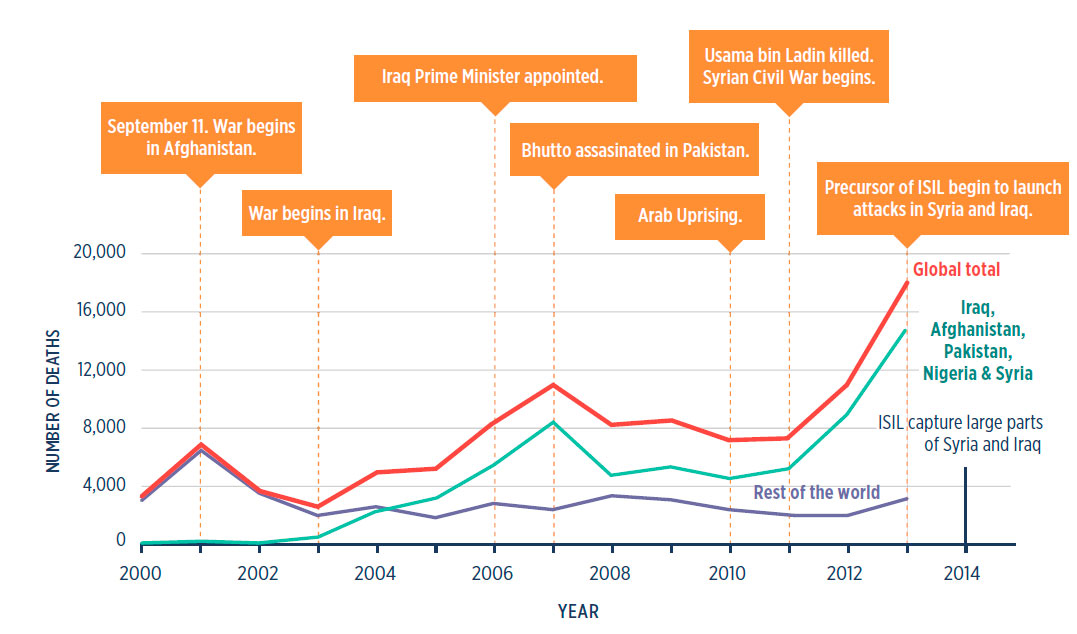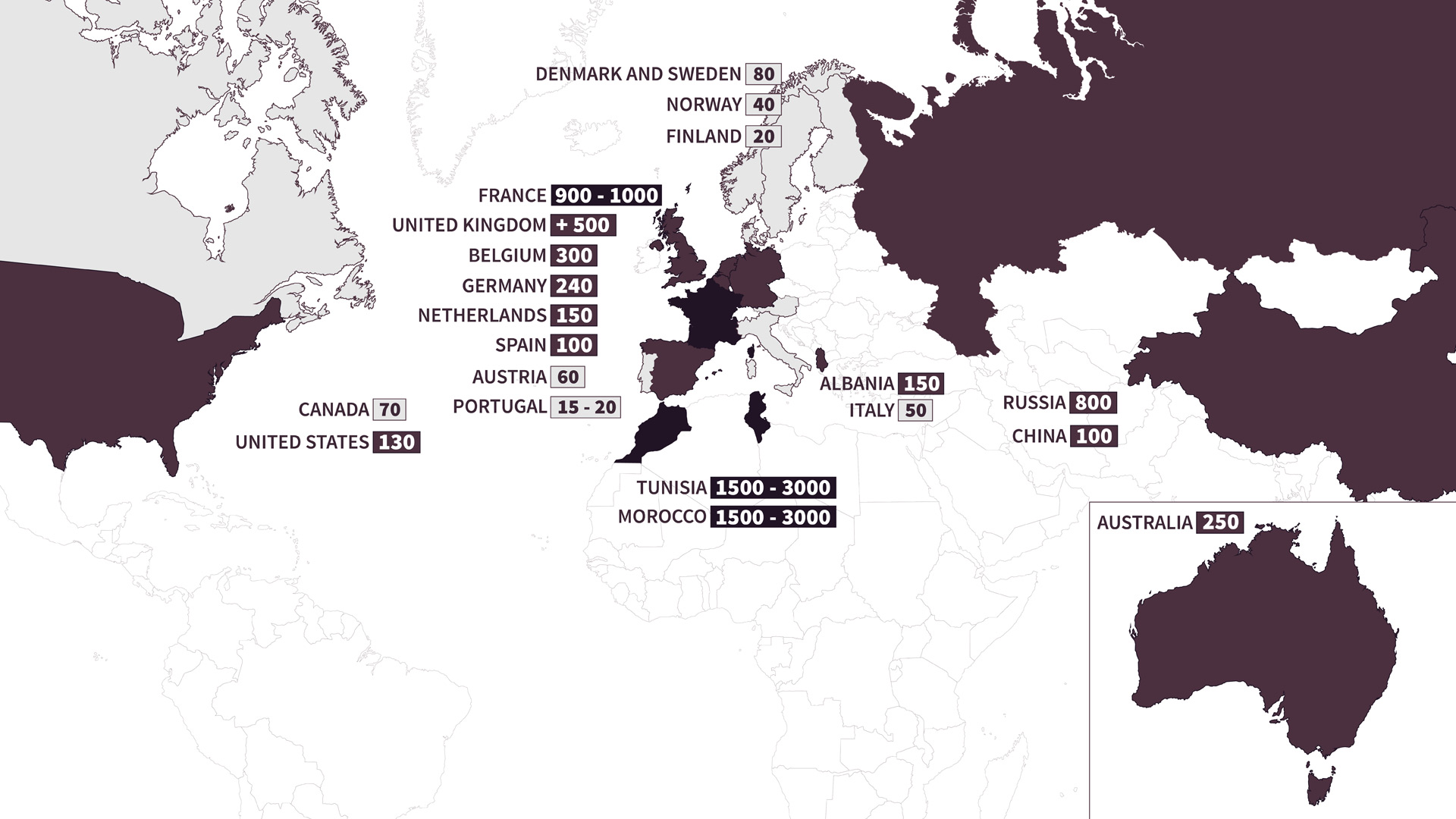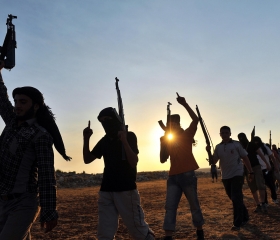After the recent Paris massacre, countering Islamic terrorism is once again the centerpiece of the European security agenda, with massive marches in support of the terrorism victims held for the first time after the bombings in Spain on September 11, 2004. EU leaders are ready to discuss a new antiterrorist package aimed at averting another tragedy.
After the recent Paris massacre, countering Islamic terrorism is once again the centerpiece of the European security agenda, with massive marches in support of the terrorism victims held for the first time after the bombings in Spain on September 11, 2004. EU leaders are ready to discuss a new antiterrorist package aimed at averting another tragedy.
According to statistics, over the past several years, the threat of terrorism has significantly grown. 2013 saw an absolute record in attacks, i.e. 2,814 events in 87 countries and a death toll of 17,958 (compared to 3,361 in 2000). From 2000 to 2014, the number of terrorist acts more than quintupled, while only 39 out of 162 countries examined during the calculation of the Global Terrorism Index were free of this type of violence [1]. As a result, there does not appear to be any living soul that doubts that terrorism is a global challenge.
Hit hardest in terms of the number of victims are Iraq, Afghanistan, Pakistan, Nigeria and Syria, all of which have plunged into extended domestic conflicts. In 2014, worldwide counterterrorist efforts focused decisively on the Islamic State (IS) – a proto-state entity that has occupied a large chunk of Iraq's territory.
In fact, the Islamic State now boasts the most efficient terrorist groups, whereas Afghanistan is going through the déjà vu of 1980s when it was the ground for the nascent Islamist international. Its current version is sure to become a clear and present danger to mankind for many years ahead. However, the greatest concern comes from the 11,000-12,000 foreign fighters in the IS ranks, among them about three thousand from France, Great Britain, Belgium and other European countries [2], who will some day return to their homelands and make up the core of the local Islamist brigades.
In the 2000s, the United States and Europe tried to contain the terrorist threat from a distance, with the Iraq and Afghanistan wars smugly fitting into the strategy. Madrid 2004, London 2005 and other European acts of terrorism were normally attributed to isolated Muslim preachers who misused the Old World rights and liberties to openly recruit youths in mosques, Sunday schools and other institutions. At that, everybody thought that traditional liberal democratic values and tolerance were sufficient barriers to ward off religious fundamentalism.
However, the Charlie Hebdo attack of January 7, 2015 was executed by brothers Said and Cherif Kouachi, the children of Algerian migrants who were born and grew up in France. Their accessory Amedy Coulibaly, the hostage-taker in a Paris kosher grocery store on January 9, was a son of Malian émigrés and also a French citizen, only making people wonder why the values-filled inoculation failed to work.
The bloodshed in France is definitely a reminder to governments that migrants and their children are finding it extremely difficult to adapt to European society. Due to the practical absence of upward social opportunities, newcomers are becoming marginalized and settling in deprived city districts and suburbs where one has few chances of moving up in the world. Their children are feeling the pain even harder, as they possess full citizenship but cannot enjoy the allegedly equal rights. In fact, we are facing an ongoing rise and an informal legitimization of a new caste society that engenders a desperate situation, when the ideas of a fairer world order are attracting hordes of grateful listeners.
The new situation also requires adjustments to the liberal democratic model which is vehemently defended and advanced worldwide by the West. If the key to defeating Islamist terrorism actually lies in winning hearts and minds through the propagation of Islam's moderate and progressive movements, freedom of speech and expression must be correlated with the religious feelings of the Muslims. Cartoons depicting Prophet Mohammed have virtually become Charlie Hebdo's trademark and, ironically, play into the hands of the Islamists because they alienate moderate followers of the Islam which bans any kind of depictions of the Prophet. How can one win the support of the Muslims by incessantly hurting their feelings? In early January, mass protests against the Charlie Hebdo cartoons swept over Mauritania, Mali, Algeria, Senegal, Nigeria and Pakistan, with a one-million-strong rally held in Grozny, the capital of the Chechen Republic.
A robust intercultural and interreligious dialogue appears to be the only weapon against Islamist terrorism whose proponents are working hard to destroy these connections. Solidarity must be shown not only with the Charlie Hebdo victims, but also toward all those who have suffered from terrorism in the world. Otherwise, Islamist preachers will acquire one more argument in support of their world vision.
The extended conflicts in Afghanistan, Iraq and Syria, as well as rising Islamist radicalism in Western Europe are prompting an overall revision to the counterterrorism strategy of the 2000s which not only has failed to avert the terrorist threat, but rather has made it much more menacing. With efforts concentrated on fighting manifestations of terrorism, its causes are largely intact and becoming more numerous, among other things due to the arrogant military strikes of the U.S.-led Western powers in North Africa, Middle East and Central Asia. Islamist terrorism, alive and well in absence of a decisive blow in the 2000s, is gaining a second wind thanks to the emerging European cells.
It appears high time for Europe to develop a set of effective counterterrorist measures. Needless to say that far from all attacks have been brought to its territory from other parts of the world. Some of them definitely have quite palpable domestic roots. Hence, the success of the new antiterrorist campaign will largely hinge on how swiftly the European leaders come to this conclusion. Otherwise, the second front of Islamist terrorism in Europe may soon grow into a harsh reality.
1. Global Terrorism Index 2014 Highlights. P.2. – Mode of Access: http://www.visionofhumanity.org/sites/default/files/Terrorism%20Index%20Facts.pdf
2. Iraq and Syria: Who are the Foreign Fighters? // BBC News Middle East. 3 September 2014. – Mode of Access: http://www.bbc.com/news/world-middle-east-29043331







